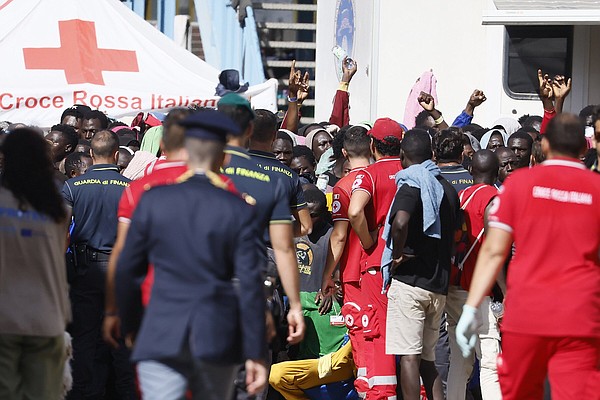
MILAN — European Union Commission President Ursula von der Leyen pledged the swift return of “irregular” migrants to their home countries and a crackdown on the “brutal business” of migrant smuggling Sunday during a visit with Italy’s premier to a tiny fishing island overwhelmed with nearly 7,000 arrivals in a single day this week.
Tensions have spiked on the island, which is closer to Tunisia than the Italian mainland, with residents expressing impatience with the constant flow of migrants trying to reach Europe from North Africa arriving on their shores — not just this week but for decades. Migrant numbers this week briefly surpassed the number of the island’s residents, who have been witness to countless tragedies.
“We will decide who comes to the European Union, and under what circumstances. Not the smugglers,” von der Leyen declared after touring the island’s hotspot. The Red Cross said 1,500 migrants remained in the center built to accommodate hundreds.
In the face of the new crisis on Lampedusa, Italy’s Giorgia Meloni has pledged tougher measures and is calling for a naval blockade of North Africa to prevent migrants on smugglers’ boats from departing.
Von der Leyen vowed to crack down on migrant smuggling and help Italy cope with the spike in arrivals. But the 10-point plan appeared to stop short of a naval blockade, at least a quick one.
She instead offered support for “exploring options to expand existing naval missions in the Mediterranean, or to work on new ones.”
The plan also includes speeding funds to Tunisia as part of a deal with the EU to block departures in exchange for aid, helping Italy accelerate asylum requests and setting up humanitarian corridors in countries of origin to discourage illegal routes.
Von der Leyen pledged the Frontex border agency’s support in ensuring “the swift return of migrants to their country of origin” who don’t qualify to stay in the EU.
And she called on EU nations to accept voluntary transfers — a frequent source of discord — as the EU dispatches experts to help manage and register the high number of migrants arriving in Italy.
“It is very important for me (to be here) because irregular migration is a European challenge and it needs a European answer. So we are in this together,” von der Leyen said.
Meloni, who has softened her once-combative stance against the EU since coming to power last year, framed von der Leyen’s visit as a “gesture of responsibility of Europe toward itself,” and not just a sign of solidarity with Italy.
“If we don’t work seriously all together to fight the illegal departures, the numbers of this phenomenon will not only overwhelm the border countries, but all of the others,” Meloni said.
She continued to press for an “efficient” naval blockade, noting that previous EU missions were not properly carried out, resulting in a Mediterranean deployment that she alleges encouraged smuggler departures; that contention is disputed by migrant experts.
The Italian government intends to quickly activate a system for repatriating migrants who are not eligible to stay in Europe as part of measures to be decided during a Cabinet meeting Monday, she said.
Save the Children expressed hopes that the visit by the two leaders would bring concrete responses, and called for a European structure to search for and rescue migrants in danger at sea.
Earlier in the day, television images showed Meloni speaking to islanders expressing their frustrations; she told them the government was working on a robust response, including $53.4 million to help the island. An unidentified person in the crowd said it wasn’t just money that they needed.
Information for this article was contributed by John Leicester of The Associated Press.






